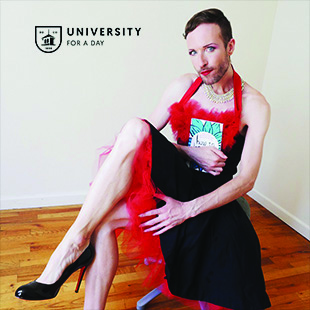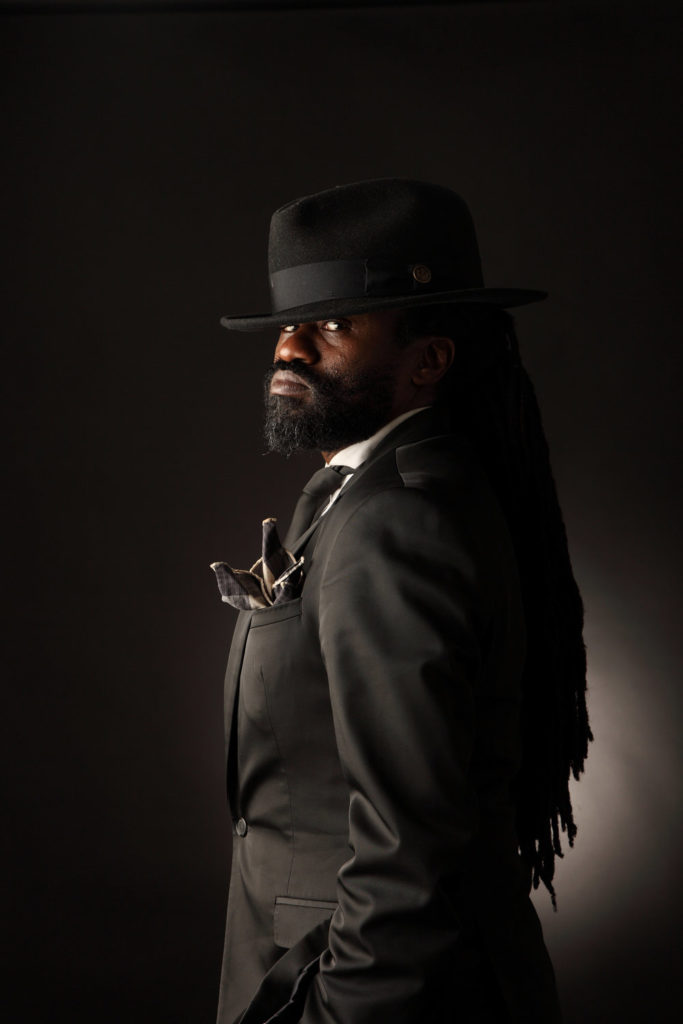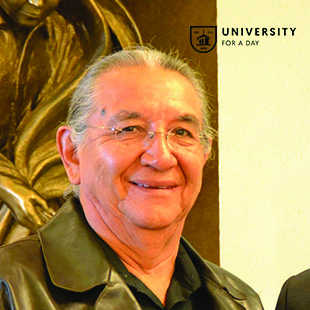
“We must not confuse dissent with disloyalty. When the loyal opposition dies, I think the soul of America dies with it.” —Edward R. Murrow
For nonbinary activist and author Jeffrey Marsh (they/them pronouns), mere existence becomes an act of political dissent, whether they like it or not.
“People who hate my guts based on looking at me or based on who they think I am, they won’t let me be nonpolitical,” Marsh says. “I have a quote unquote political Twitter to them because me just existing is a political act.”
It’s “unfortunate,” Marsh says, that queer lives get politicized, but Marsh leaned into it. A gentle demeanor -— nurtured by a 20-year Buddhist practice — drove Marsh to step into their role as a leader in nonbinary identity education and justice. Authenticity became Marsh’s battle cry, kindness their strongest expression of dissent.
Just in time for election season, Marsh will join three other scholars and activists on Sept. 28 at Chautauqua for “The Politics of Dissent,” a one-day educational summit on how to respond to the pressing societal issues of our times.

When the event programming staff at Chautauqua talked about developing a one-day event for experts to dissect hot-button issues, Mark Nicolella, general manager of public events, knew right off the bat who he wanted to include.
“I’d had the idea to try and bring in Nadya [Tolokonnikova] from [political art collective] Pussy Riot to do a standalone speaking engagement here at Chautauqua this summer,” he says. “So we kind of married those two concepts together to flesh out what is a full day of pretty cool speakers.”
In August 2012, Tolokonnikova and bandmate Maria Alyokhina — both new mothers just barely into their 20s at the time — were sentenced to two years’ imprisonment for “hooliganism motivated by religious hatred,” according to The Guardian, after an anti-Putin Pussy Riot performance at Moscow Cathedral of Christ the Savior. Both were sent to penal colonies, Alyokhina to Perm, Tolokonnikova to Mordovia. Both are forced labor camps located near Siberia.
On Sept. 23, 2013, Tolokonnikova penned an open letter about the abhorrent conditions of the prison and began a hunger strike in protest.
“My brigade in the sewing shop works 16 to 17 hours a day,” she wrote. “From 7:30 a.m. to 12:30 a.m. At best, we get four hours of sleep a night. We have a day off once every month and a half. We work almost every Sunday.”
After being hospitalized and moved to different prisons, Tolokonnikova was released in December 2013.
“After I showed that I could really stand for myself, then my life in prison really changed,” she said in an interview with NowThis News. “It’s the same with activism, the same with protesting, that you cannot just push the button and everything will just change in a second.”
She has not reserved her criticism for Russian president Vladamir Putin. In 2016, Pussy Riot released a song called “Make America Great Again”:
“Let other people in / Listen to your women / Stop killing black children / Make America Great Again.”

Modern-day civil rights activist Reverend Osagyefo Uhuru Sekou can speak to America’s grisly history of murdering unarmed young black men. The author/musician/theologian was arrested in August 2015 outside the U.S. attorney’s office in downtown St. Louis, Missouri, during a demonstration against police brutality.
When asked how to engage more people, those with privilege, the Reverend admits that’s not his goal.
“I’m not that interested in them,” he says. “I don’t spend a lot of time trying to convince people.
“The question for me is that for white brothers and sisters, when Tamir Rice was shot and killed in less than five seconds, did they believe that it was their child who was shot in less than five seconds? When India Clark or Kiki Herring, trans folks [of color] who were killed, did [white people] feel that they were a part of their family? Until they feel that, not as abstract intellectuals, but when you fundamentally can grieve in your soul for a mother who’s lost their child or for a child in a cage, then we gonna get some movement.”

David Archambault has been working on creating movement in the educational system for Native Americans for decades. Born on the Standing Rock Sioux Reservation, Archambault argues that education in the U.S. has acted as a form of cultural geneocide for native people, effectively wiping out their languages and traditions. In a TedX talk from 2013, Archambault points to the Carlisle Indian Industrial School in Pennsylvania, the first nonreservation Indian school funded by the federal government.
“What happened to [these children] was fear was put in them,” Archambault says in the presentation. “They were being handled by people that had the ‘save the child, kill the Indian,’ type of thinking. Then they were made to feel inferior. They were spoken to in English so they didn’t understand what was going on and for their ineptness they were punished. There were two primary emotions going on for these children: fear and shame. Anybody working from that decision-making basis, it’s not going to go good.”
The full-day event at Chautauqua promises heavy subject matter, but each presenter has optimism at the core of their message.
“As far as I can tell from my experience of being a human being,” Marsh says, “hatred, discrimination, bigotry, judgment, jealousy… there are lots of things that are not our authentic nature as human beings.”














